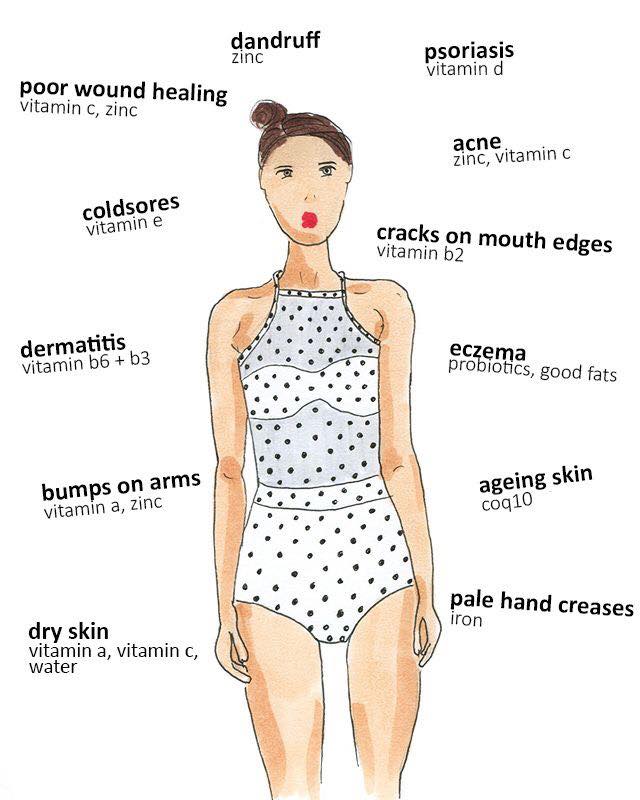Your skin is an organ, like your brain, and like the brain, needs good food to nourish it. This is especially true because the skin is the largest organ in the body. It makes up around 15% of your total weight. We touched on how nutrition affects your skin last year. In this column we will go into it in more detail in this column, by looking at specific skin problems and what nutrients are linked to them.
Ageing skin – Linked to low Vitamins C, or E or antioxidants* (e.g. CoQ10).
Acne – This can be due to low zinc, antioxidants or vitamins E or C.
Bumpy arms or thighs – This is common and could be a sign of vitamin A or zinc deficiency.
Cold sores – This is more common if you have low vitamins C or E or zinc and L-lysine (an amino acid).
Dry Skin – Deficiencies in vitamin A, C, zinc and water can cause dry skin. It is also more likely if you are low in fatty acids (FA’s or omega oils).
Poor wound healing – This can be due to low protein, vitamins A and C, and zinc.
Sources of these nutrients
Antioxidants are found in many foods including meat, spices, herbs, fruits, vegetables and legumes (e.g. chickpeas, lentils, green beans). Particularly high sources include cinnamon, blueberries and kidney beans.
Fatty Acid’s (the best is omega 3) are found in oily (mercury free) fish, grass fed meats, fruits (e.g. avocado and olives), and nuts (not peanuts).
L-lysine is an amino acid (a building block of protein) found in legumes, fish, meat and vegetables.
Vitamin A is found in very high amounts in animal organs such as liver but is also found in root vegetable such as carrots and leafy greens (e.g. spinach).
Vitamin C is found in fruits and vegetables.
Vitamin E is found in in many foods but in highest amounts in avocadoes, nuts, and seeds.
Zinc can be found in most animal sources (i.e. chicken) but the highest amount is in oysters. For vegetarians and vegans, baked beans have the highest source.
As with all nutrient deficiencies you may need to supplement your food intake to get a high enough dose. However not all supplements are the same. Most over the counter supplements help you make expensive urine, e.g. most zinc supplements are too low a dose and are not in the highly absorbed picolinate form. (More on this in next months’ Dr Wellness column). Supplements are particularly needed in our modern world as our food is grown in poor soils, harvested before reaching ripeness, irradiated, fumigated and stored and cooked poorly so it contains less nutrients than previously. Organic foods contain higher nutrient levels than non-organic and also don’t contain damaging pesticides that can undo some of the nutritional benefits. Talk to an Integrative (Wellness or Holistic) Doctor for more information on how to test for and treat nutrient deficiencies.
*Antioxidants protect the body from harmful molecules called free radicals. Free radicals create damage which can lead to development of blood vessel narrowing (leading to e.g. strokes and heart attacks), cancer, and other conditions.


